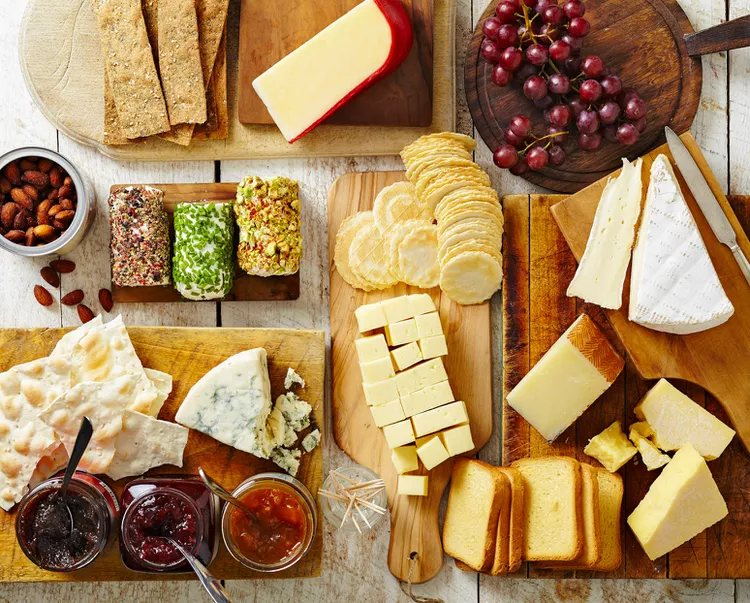How to Make a Cracker and Cheese Tray Your Guests Will Swoon Over

If you want to put together a cracker and cheese tray for your next party, it may be less work than you think. Whether you choose to go for a fancy cheese board or keep it simple, the snacks at your next get-together will be a smashing success.
When thinking about snacks or appetizers for a gathering, making a cracker and cheese tray (especially a large one) might seem intimidating at first, but with the huge variety of cheese and crackers out there, the more, the merrier! As long as you choose several different cheeses, you really can't go wrong. There are no rules for how to make a cheese board that's a showstopper, but a few easy tips can help if you aren't sure where to start.
Get inspired by the many cheese choices, and create something you and your guests will love nibbling on.
Cracker and Cheese Tray Essentials
Start with the star of the platter: Cheese! When brainstorming cracker and cheese tray ideas, remember that it's best to provide a few different varieties of cheese since your guests' tastes can vary. The mix of flavors and textures also makes the tasting experience more fun, and you or a guest might discover a new favorite, especially if you include a couple of offbeat cheeses.
For a basic cracker and cheese tray, include at least one of the three types of cheese—hard, soft, and blue. Familiar hard and semi-hard cheeses include Swiss, cheddar, and Gruyère, while a few soft cheese choices include goat cheese, Camembert, chèvre, and Brie. Some blue cheeses to consider include Gorgonzola, Roquefort, and Stilton.
You can dress up your selection with cheese balls or goat cheese logs rolled in fresh herbs, nuts, or spices. Mix it up a little more by including a few in-between cheeses, like semi-soft varieties (Fontina, Havarti, Muenster). Warm cheese is always a hit, too (here's a hint—if you haven't had Halloumi cheese, now is the time!). The best cheese for a cheese board is any variety you and your guests will try.
Test Kitchen Tip
When you're determining how much cheese you'll need, keep in mind how big the flavors are. You'll be okay with smaller amounts of strong cheeses like goat and blue cheese because guests tend to take less per serving. Invest in more of each mild cheese you include, like cheddar and Swiss, because their flavors aren't as intense and are popular among most partygoers. And if you're serving other appetizers alongside the cracker and cheese tray, you won't need as much as you would if it's the only snack at the party.
Crackers and Spreads
Include a variety of crackers and bread slices and maybe a fruity spread or two for guests to mix, match, and assemble their perfect bite. You can use a few varieties, like multigrain and butter, for crackers. Using one kind is fine if you're making a small cracker and cheese tray. You can also branch out a little to include slices of toasted bread.
As far as spreads go, you can never go wrong with chutney, and some jellies will also be popular (fruit spreads are usually a safe bet). Pepper jellies can bring a little heat to your cheese board.
How to Arrange a Cracker and Cheese Tray
When you're thinking of cracker and cheese tray ideas, picking your favorites to include might seem like the easy part. Don't stress if you get stuck when thinking about arranging a cheese board worthy of posting on Instagram. The trick is simple—just heap everything on. The more tightly packed in, the better.
To make it easy for your guests, group each food in one spot on your cheese and cracker tray for easy access; otherwise, there are no rules. If it helps you to have a guide, you can arrange similar ingredients next to each other—keeping all your cheeses together, for example. It might also help to place larger items first—if you have a bowl of crackers or bread slices or a larger wheel of Brie, position those on the platter first, then fill in with smaller cheese slices and crackers. Letting all the ingredients touch will add to the look of a bountiful, large cheese board. If you have small extra spaces, add even more cheese, a few nuts, or fresh herbs and fruits.
Consider a Charcuterie Board
If you want to make a fancy cheese board and start adding meats, fruits, and other crudités, it might be time to consider upgrading to a full-on charcuterie board. Add cured meats like prosciutto and salami, grainy and specialty mustards, dried and bite-size fruits, including figs and apricots, and a few small cookies or gourmet candies. Include crudités in various colors, like carrots, snap peas, and radishes. Smoked, seasoned, and roasted nuts are great additions, too.
How to Pair Wine and Cheese
Need a few drinks to pair with the cracker and cheese tray? Wine and cheese are a natural, delicious, and sophisticated pairing. One safe tip is to pair wines with cheeses produced in the same country or region (pairing Spanish wines and cheeses, for example). Another good rule of thumb is to try to match up flavor intensities. A dark Cabernet Sauvignon has a strong flavor so that it might overpower delicate cheeses, but it'll pair well with similarly intense flavors like an aged cheddar or Gouda.
If you want to serve lighter wines like Pinot Noir or Pinot Grigio, less-intense cheeses like Brie and Gruyère will work just fine. If you have a specific wine or cheese in mind that you want to serve (or even if you don't), visit a specialty shop or supermarket on sampling day, if possible, for a taste before buying, or ask for recommendations while you shop.